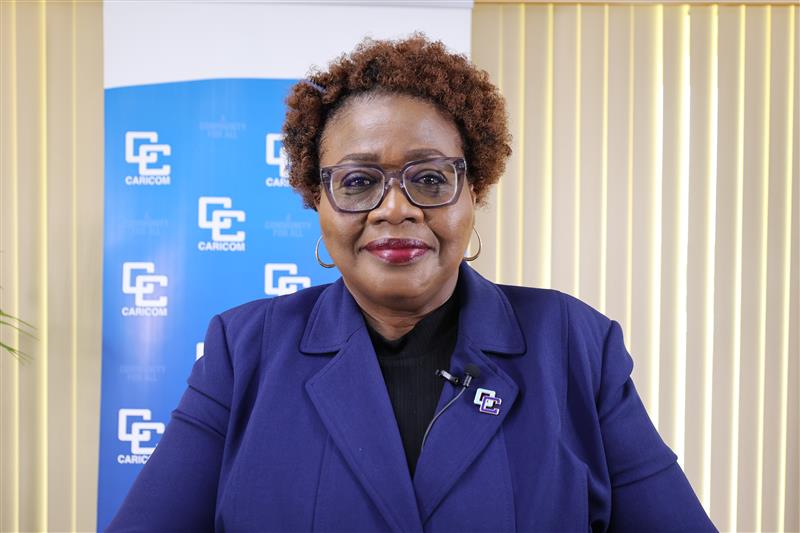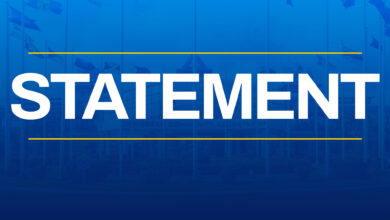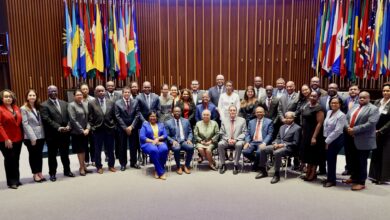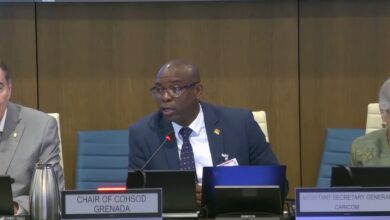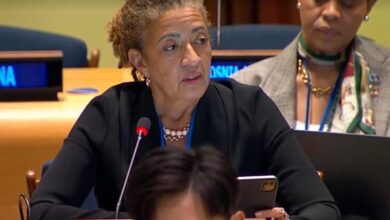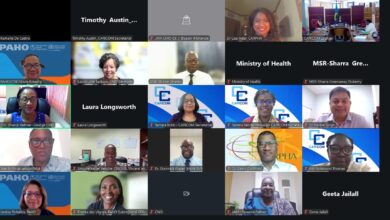CARICOM Heads of Government continue to be actively concerned about the implications of crime and violence on the social development of the Region. To date, two symposiums on Crime and Violence as a Public Health Issue have been convened, keeping at the forefront of the deliberations the importance of balancing the rights of the individual and the public safety interests of the whole of society.
Beverly Harry-Emmanuel, Advisor, Social Development, Caribbean Community (CARICOM) Secretariat
Advisor for Social Development at the CARICOM Secretariat, Ms Beverly Harry-Emmanuel, says CARICOM Heads of Government continue to be actively concerned about the implications of crime and violence for the Region’s social development.
Delivering remarks at the CARICOM Implementation Agency for Crime and Security’s (CARICOM IMPACS) Observance of International Women’s Day, she stated:
“To date, two symposiums on Crime and Violence as a Public Health Issue have been convened, keeping at the forefront of the deliberations the importance of balancing the rights of the individual and the public safety interests of the whole of society. A significant outcome of these symposia was the agreement to “strengthen the development of security as a fourth pillar of the Community, so that collectively we can better address the extra-territorial threats to citizen security; including strengthening the capacity of the Community’s Security and Justice agencies to adopt and implement a public health approach.” This declaration is a clear signal of how CARICOM views its role in protecting human rights, democracy, peace and security in our Region.”
Additionally, she highlighted that the CARICOM Secretariat continues to work with Member States to adopt the Regional Common Standards for Police and Justice Agencies to mitigate Violence against Women and Girls and Family Violence. She explained that the adoption of the Standards will strengthen systems to hold perpetrators accountable for violence while ensuring victim safety and strengthening societal messaging that gender-based and family violence are unacceptable in any measure or circumstance.
Please read her complete remarks below:
REMARKS FROM
BEVERLY HARRY-EMMANUEL
ADVISOR, SOCIAL DEVELOPMENT, CARIBBEAN COMMUNITY (CARICOM) SECRETARIAT
OBSERVANCE OF INTERNATIONAL WOMEN’S DAY
12 JANUARY 2025
Ladies and gentlemen
I welcome this opportunity to address you this morning. On behalf of all of us at the CARICOM Secretariat, I applaud CARICOM IMPACS, under the astute leadership of Colonel Michael Jones, for hosting this event to mark International Women’s Day 2025, which was observed on Friday, 7 March. The Secretariat is pleased to be associated with this event. Allow me to share some thoughts for consideration during the discussions to follow around our theme, “Strength and Resilience of Women on the Frontline.”
As we join the international community in observing this important occasion, we must acknowledge that we have made noteworthy strides forward in achieving gender equality. Globally, there have been significant legal reforms to advance gender equality and to address violence against women and girls. Regionally, our legislatures reflect increasing representation by women. However, women still have only 64% of the legal rights of men (UN Women, 2024).
According to UN Women, in 2024, 44% of countries showed improvements in the quality of education, training, and lifelong learning among women and girls. Girls surpass boys in upper-secondary completion rates in most regions, including ours. A question for exploration is whether there is correlation among the higher levels of educational achievements of women and girls, social cohesion and increasing incidences of crime and violence which disproportionally threaten the right to life, liberty and security of women and girls.
CARICOM Heads of Government continue to be actively concerned about the implications of crime and violence on the social development of the Region. To date, two symposiums on Crime and Violence as a Public Health Issue have been convened, keeping at the forefront of the deliberations the importance of balancing the rights of the individual and the public safety interests of the whole of society.
A significant outcome of these symposia was the agreement to “strengthen the development of security as a fourth pillar of the Community, so that collectively we can better address the extra-territorial threats to citizen security; including strengthening the capacity of the Community’s Security and Justice agencies to adopt and implement a public health approach.” This declaration is a clear signal of how CARICOM views its role in protecting human rights, democracy, peace and security in our Region. Through its Directorate of Human and Social Development, the Secretariat is already deploying resources to enhance citizens’ security.
Additionally, forms of violence such as the trafficking of persons, sexual exploitation, and the use of electronic media, particularly online platforms, have far-reaching social, economic and developmental consequences for individuals and society.
The statistics suggest that, as a group, women and girls are disproportionally affected. Moreover, National Prevalence Surveys on Gender Based Violence confirm that nearly 1 out of 2 of ever-partnered women aged 15-64 have experienced one or more of the four types of intimate partner violence (IPV) in their lifetime (physical, sexual, psychological and/or economic). This reality presents a major impediment to the security and integrity of the women of the region. There is room for much more to be done in the areas of legal protection and enforcement and for individual and collective ownership of the responsibility to act to reverse these trends.
The CARICOM Secretariat continues to work with Member States to adopt the Regional Common Standards for Police and Justice Agencies to mitigate Violence against Women and Girls and Family Violence. Adoption will strengthen systems to hold perpetrators accountable for violence while ensuring victim safety and strengthening societal messaging that gender-based and family violence are unacceptable in any measure or circumstance.
Please permit me to turn our attention to the Women, Peace, and Security Agenda established under the United Nations’ Security Council Resolution 1325, which provides a critical framework for embedding gender perspectives into peace and security efforts. This Agenda emphasises the importance of full, equal, and meaningful participation of women in conflict prevention, resolution, and peacebuilding processes. The integration of gender considerations into security policies and initiatives enables Caribbean nations to enhance the effectiveness and sustainability of their peace and development efforts, support inter-agency collaboration and address the impact of violence including those associated with transnational organised crime.
Moreover, the Women Peace and Security Agenda recognises that the effects of climate change in the region bear significant financial, infrastructural and social implications, especially with regard to gender inequalities as the impacts of natural disasters often amplify pre-existing vulnerabilities with the potential to push women and marginalised groups even further into the margins through increased incidents of intimate partner violence, heightened economic insecurity, and heavier work burdens to ensure survival.
Gentlemen in the audience, allow me a minute to specifically address the women present and all those who would hear this message. Sisters, we know that we are resourceful and that we have the capability to instigate, lead, achieve and sustain the changes that are required to drive the development of women and our region. This capacity is almost instinctual. We do it every day on behalf of our families and ourselves.
The Community is currently crafting a Gender Development Policy. Seize this opportunity in whatever capacity, whether civil society, government, expert or citizen -Caribbean Woman to be advocates and key actors in the process, to ensure that an environment emerges that supports full and sustainable participation of women and girls in the development of our Region.
Ladies and gentlemen, thank you for this opportunity to participate in today’s discussions.

